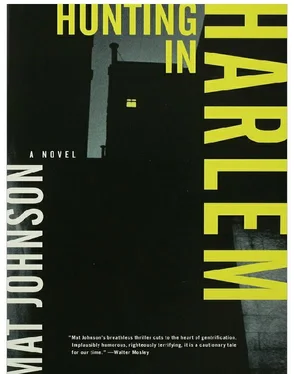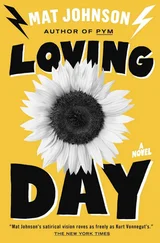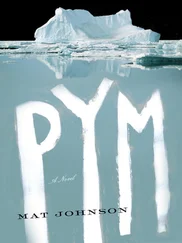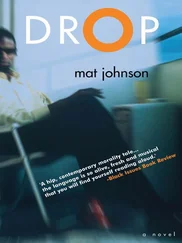There were at least a dozen more photos, but Lester reached for the dirty envelope on the floor, stuck the contents back inside, took a roll of packing tape off the bed to seal it up thoroughly before reopening a trash bag along the wall and sticking it deeply inside.
"Is that all we're going to do?" There was indignation in Snowden's voice, but there was relief too.
"There's nothing else that needs to be done. He's dead now."
"How did he die?"
"He had an accident." Lester picked up his broom and started sweeping again. Snowden needed to sit down. He walked over to the bare mattress, became nauseous at the sight of it and opted for a bare wall and floor.
"Someone like that, someone like that deserves worse than that."
"I don't know. Apparently, his brakes went out on him on the FDR. From what I hear, it was pretty gruesome. Couldn't stop, knew he couldn't stop. Speeding to begin with. A lot of sharp turns on that thing, heavy, fast traffic. Very narrow lanes. Must have made for some pretty scary minutes." Lester's tone was casual, calming. It was like none of the facts present were new to him.
"You knew about this?"
"What?" The way Lester said it, Snowden immediately regretted the question, was about to apologize when Lester continued. "I knew he was a registered sex offender. We found that out after we bought the property. Specifics? Of course not. But there's only one cure for people like that, isn't there?"
Lester stopped sweeping, looked over at Snowden for him to take over the exercise, then took his seat against the wall.
"Well that's the thing, am I right?" Lester continued. "You take almost any block in Harlem, almost any apartment building, and out of every hundred people, ninety are basically decent, hardworking folk just trying to take care of their own. But that ten, the drug dealers, the thugs, thieves, and rapists, those that abuse their children directly and through neglect, the ones who have no respect for others, civilization, society, all of these parasites set the tone that everybody else has to live by. 'The Terrible Tenth,' I like to call them, that keeps everybody else down."
"At least, with this bastard's death, it's down to 'The Terrible Nine Point Nine Nine Percent' now," Snowden said, immediately regretting the callousness of the statement. Lester just smiled though, sat there puffing on his cigarillo, watching his smoke rise around them.
The night ended with beer, two forties held one in each of Snowden's arms like he was headed for a party. Walking up his building's steps, Jifar was in his path. The boy was laid out on his dirty landing with paper and crayons. It was one o'clock in the morning.
"What are you doing?" Snowden asked him.
"What's it look like I'm doing? I'm drawing."
"Drawing what?"
"I'm drawing the Chupacabra." The paper had been cut from the side of a brown paper bag, on it was the image of a green fanged thing with too many arms.
"You got school tomorrow, you need to be in bed. What's a Chupacabra?"
"It's the monster eating people in Washington Heights. Mannie Ortiz knows someone who saw it. If I do this good, we're going to give it to the police so they can catch him."
"Why aren't you in bed, little man?"
"I'm locked out, and I left your key in my room, in my hiding space," Jifar admitted.
There was music vibrating the door of Jifar's apartment. After a while, Snowden gave up on knocking, just started kicking it until the sound stopped and the peephole darkened.
"Come get your boy," Snowden said into it. The door began unlocking.
"Nigger, you woke me up." Baron Anderson in his gray WELCOME TO NEW YORK, NOW GET OUT T-shirt and wrinkled Y-fronts. Snowden attempted to continue the discussion but Anderson walked out in the hall in his bare feet yelling, "Get the fuck in here," grabbing his boy by his arm and disappearing again, the door slamming in back of them.
The final sound sent other doors along the floors slowly unlocking, other heads leaning out doorways to stare at Snowden as if he was the villain. Snowden ignored them, reached down and rolled up the picture, forcefully shoved each crayon back in the box, imagining he was cramming them up the father's nose instead.
BOBBY FINLEY, THE GREAT WORK
AFTER CLASS SNOWDEN would go over to Bobby's house and they would get drunk. The game was to go to a new bodega each time and get 160 ounces of the cheapest beer they could find. They called it a game because to acknowledge that it was all they could afford was depressing. Then they would spend seventy-five cents on the New Holland Herald and Bobby would read the misprints and more egregious grammatical errors out loud. At first, Snowden didn't know what the big deal was, at least the paper was trying, but some of these bloopers were just too ridiculous and after a while they were both laughing until they just couldn't anymore because it hurt too much. This would usually be followed by a discussion on the future of black people, hopeful or pessimistic. Both had majored in African-American studies during their college careers, one of many similarities they were discovering. If you added the amount of undergraduate credits they had together it was enough for one bachelor's degree, which gave them a bit of confidence in putting their heads together, even though they were pretty drunk heads by the time they really got into it.
Once they had been peeing clear for hours, when simple things like balancing a bowl of cereal in their hands became nearly impossible, the conversation often reverted to simple primal confessions. This is when Bobby slurred that he'd burned down his mother's boyfriend's house after the man raped her, that the man was alive but probably wished he wasn't. This was when Snowden talked about all the foster homes, told the funny stories he could about the quirks of each one, how he had been returned to his father in ninth grade, how even he was surprised at the way his father's nose disappeared into his face when he punched it. How he couldn't even remember the last thing the man had said to him that had pissed him off so much, but would never forget the smell of the adrenaline-rich blood that filled his own nose, the orgasmic bliss of momentarily giving his anger free reign.
Bobby's place was smaller than Snowden's, made even more so by the books in milk crates that lined the walls. Aside from the ones on the shelves in the bathroom, every single book in Bobby Finley's
house was a hardcover first edition of The Great Work, a novel by Robert M. Finley, all signed and numbered by the author himself. He had so many that he used them for furniture, laying a wooden plank and cushions over crates for his couch and bed. Bobby started this collection four months after the publication of The Great Work, three years before, picking up the first editions at near 85 percent discount on the remainder shelves of large bookstore chains. They seemed so forlorn sitting there, each his dream incarnate, rejected, abandoned. That was how the collection began.
The Great Work received only two reviews, both by publishing magazines pretty much obligated to review anything with pages and a spine. Both were dismissive, seemed confused and not a little hostile, as if the text that had been given to them was not printed on paper but instead tattooed on the shaved flesh of a large and bemused grizzly bear. After reading them, it took two weeks for Bobby Finley to stop fixating on burning the buildings that housed the critics, the magazines, and the distributors, in that order.
Later, Bobby managed to douse those desires with the knowledge that both critics had been white and unfortunately had proved themselves unable to separate themselves from their preconceived notion of what to expect from an author of African descent, and therefore had blinded themselves to the genius The Great Work really was. This perspective was reinforced by the fact that both reviewers had made major factual errors when describing the plot, errors that coincided with a misprint in the summary on the dusk jacket, leading Bobby to determine that at best they'd given it a sloppy, rushed read or, as he suspected, hadn't read the whole book at all.
Читать дальше












